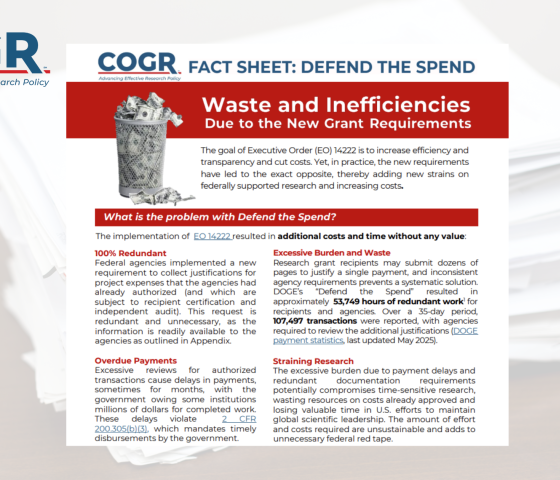Executive Order 14222, intended to enhance efficiency and transparency and reduce costs in federally funded research, has instead imposed significant new...
Other Post Award
Financial research accounting, management, and billing activities are subject to various and evolving requirements. COGR assesses and reports on significant changes, as well as advocating for practical requirements that provide effective safeguards without undue administrative burden.

Featured
Points to Consider for Reimbursement of Expenses Under Active Grants (V.2): Framework for Navigating the 2025 Administration Transition
Changes to federal payment systems, processes, and requirements implementing
Updated: Costing Points to Consider for Terminations and Suspensions (V.2)
Communications from federal agencies about terminations and suspensions are inconsistent with each other and often with sponsor policies and Uniform Guidance.&…
Resources
Point of Contact
All Other Post Award Articles
Update from COGR on Department of Energy Limitations on Reimbursement of Indirect Costs
The document outlines recent policy changes implemented by the Department of Energy (DOE) regarding the reimbursement of indirect costs under financial assistance awards. While the policy explicitly exempts Institutions of Higher Education (IHEs), it imposes significant limitations on indirect cost recovery for other recipient types, such as state and local governments (capped at 10% of total awar
COGR, AAMC, AAU, and APLU Submit Joint Comments to NIH on Publication Cost Limits
The Association of American Medical Colleges, Association of American Universities, Association of Public and Land-grant Universities, and COGR submitted joint feedback to the NIH opposing proposed limitations on allowable publishing costs for NIH-funded research, arguing that such limits could impede effective dissemination, create inequities among institutions, and hinder early-career researcher
Updated: Costing Points to Consider for Terminations and Suspensions (V.2)
Communications from federal agencies about terminations and suspensions are inconsistent with each other and often with sponsor policies and Uniform Guidance. This section provides a review of the relevant sections of Uniform Guidance and a list of items for institutions to consider when following sponsor policies and instructions and determining best practices.
Costing and Financial Compliance (CFC) Committee Virtual Open House on August 19 - Slide Presentation
The document details the agenda and key discussion points from the upcoming Costing and Financial Compliance (CFC) Committee Open House, scheduled for August 19, 2025, under the auspices of COGR. Moderated by Jeremy Forsberg and Cindy Hope, the session will focus on current challenges and evolving requirements in financial compliance for research administration, particularly in light of recent fed
Points to Consider for Reimbursement of Expenses Under Active Grants (V.2): Framework for Navigating the 2025 Administration Transition
Changes to federal payment systems, processes, and requirements implementing Executive Order 14222 — Implementing the President's "Department of Government Efficiency" Cost Efficiency, issued February 26, 2025, have significantly incre
Fact Sheet: Defend the Spend
Executive Order 14222, intended to enhance efficiency and transparency and reduce costs in federally funded research, has instead imposed significant new administrative burdens and redundancies, notably through the “Defend the Spend” initiative. These new requirements force recipients to repeatedly justify pre-approved expenses, leading to payment delays, increased costs, and wasted effort, while
Frequently Asked Questions (FAQs) on JAG Effort and FAIR Model
The document outlines the proposed FAIR (Financial Accountability in Research) model, designed by the Joint Associations Group on Indirect Costs (JAG) to replace the current system for indirect cost recovery (F&A costs) in federally funded research. The FAIR model aims to enhance transparency and accountability by establishing clear, trackable cost categories, aligning project costs with actua
COGR, NACUBO, and 16 Other Organizations File Amicus Brief Supporting Community Appeal of Indirect Cost Reimbursement Rate Cap
The document is an amicus curiae brief filed in the United States Court of Appeals for the First Circuit by the National Association of College and University Business Officers and seventeen other higher education associations, supporting the plaintiffs-appellees—various states, academic institutions, and medical associations—against the National Institutes of Health (NIH) and the U.S. Department
DOD ONR Indirect Cost Memo
Not in effect. AAU v. DOD: The District Court held that it had subject matter jurisdiction over the case and granted summary judgement in favor of the plaintiffs. The District Court declared that the DOD’s Rate Cap Policy was invalid, contrary to law, and arbitrary and capricious.
Joint Associations Group (JAG) on Indirect Costs: What’s New and What’s Next: June 2025 COGR Meeting
The document outlines the efforts of the Joint Associations Group (JAG) on Indirect Costs, comprised of leading national academic associations, independent research institutions, hospitals, and foundations, to address growing concerns regarding the current Facilities and Administrative (F&A) cost model for U.S. federally funded research. In response to increased scrutiny and indications from C



